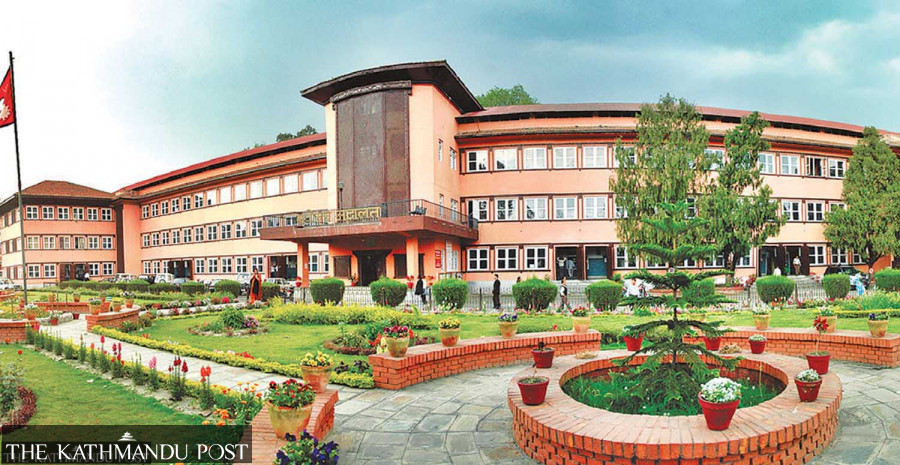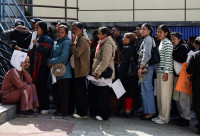National
Supreme Court seeks explanation for pardon granted to murder convict
President on the Constitution Day had commuted the jail terms of 670 convicts.
Binod Ghimire
The Supreme Court has ordered the President’s Office and the Office of the Prime Minister and Council of Ministers to furnish a written justification for the pardon granted to Yog Raj Dhakal, aka Regal, a murder convict affiliated to the Nepali Congress.
The bench of Justice Manoj Kumar Sharma ordered the two state agencies to present their justifications and grounds for the amnesty by October 11.
Responding to a writ petition by Bharati Sherpa, then wife of Chetan Manandhar who was murdered in cold blood by Dhakal, the court, on Thursday, also directed the Ministry of Home Affairs to ensure security to Bharati and the Manandhar family.
The victim’s family says that it is terrified by the release of Dhakal and fears harm.
“Looking at the gravity of the matter, it is necessary that the petition be heard by a full bench,” said the court’s ruling, listing Sherpa’s petition on priority. “The final hearing will start on October 12."
A full bench consists of at least three justices. The decision of the full bench will also set a precedent for determining the criteria for presidential pardons.
Justice Sharma’s bench has sought the copy of the original decision from the President regarding the pardon.
Demanding nullification of the pardon granted to Dhakal, Sherpa, on Sunday, filed a writ petition at the Supreme Court. The hearing on the petition couldn’t be held on Monday and Tuesday, although it was on the list of cases.
“There is no point arresting criminals involved in heinous crimes and convicting them through courts, if they are pardoned shamelessly, without completing most of their jail term. I ask the court to overturn the Cabinet’s recommendation for the pardon and the President’s move to implement it,” stated the petition by Sherpa.
On the recommendation of the Cabinet, President Ramchandra Paudel on the eve of the 8th Constitution Day on October 19 had pardoned the remaining jail terms of 670 convicts, including Dhakal.
In July 2015, Dhakal, a local Congress worker and gangster from Banke, had killed Manandhar in broad daylight with domestic weapons. He was convicted of the murder and given 20 years jail by the Banke district court in April 2018.
Sherpa started a hunger strike on Wednesday, demanding a rollback of the decision while also fighting a legal battle against the pardon.
Dhakal had served just eight years of jail term when his remaining 12 years were pardoned. The government decision to pardon his remaining term has drawn widespread criticism. On Constitution Day, video clips on social media showed Dhakal’s supporters giving him a grand welcome at the prison gate with a large convoy of cars.
A group of Rastriya Swatantra Party (RSP) leaders on Monday had drawn the President’s attention to the issue.
During his meeting with the RSP leaders, the head of state claimed that he had only given his nod to the pardon decision made by the Council of Ministers.
While he granted pardon to Dhakal and 669 other convicts, Paudel had returned 34 other names to the home ministry seeking the criteria from the government for recommending the pardons.
The Office of the President asked the Ministry of Home Affairs to present the grounds for pardoning the convicts. The government had presented two lists for pardon. One included the 670 prisoners who had completed 50 percent of their jail terms and had demonstrated good behaviour as prisoners. The list forwarded by the Cabinet was approved by the President.
The decision to commute the jail terms of 34 other prisoners was forwarded by the home ministry as per clause 159 of the National Criminal Procedure (Code) Act 2017, but was eventually rejected by the President.
A person who is sentenced by a court to jail for an offence may make a petition to the President through the Ministry of Home Affairs, for pardon, suspension, alteration or reduction of that sentence. In the process per the clause, the petitioner attaches a copy of the court's judgement, based on which he or she was sentenced.
As the home ministry’s decision was not backed by documents, Paudel refused to grant pardons, but gave his nod to the list of 670 forwarded by the Cabinet.
Not only those from the opposition parties, but the ruling party leaders also have objected to Dhakal’s pardon.
Gagan Thapa, a general secretary of the Nepali Congress, said successive governments were misusing the provision of presidential pardon. He demanded the government make public the ground on which Dhakal had been granted amnesty.
“The government must inform the House about the decision that has been widely criticised,” Thapa told the House of Representatives on Thursday. “There must be an integrated law in place to guide the pardon process, tightening the legal loopholes.”
He also said that as many as 6,743 convicts have been granted pardons since the promulgation of the Constitution of Nepal in 2015.




 20.9°C Kathmandu
20.9°C Kathmandu














